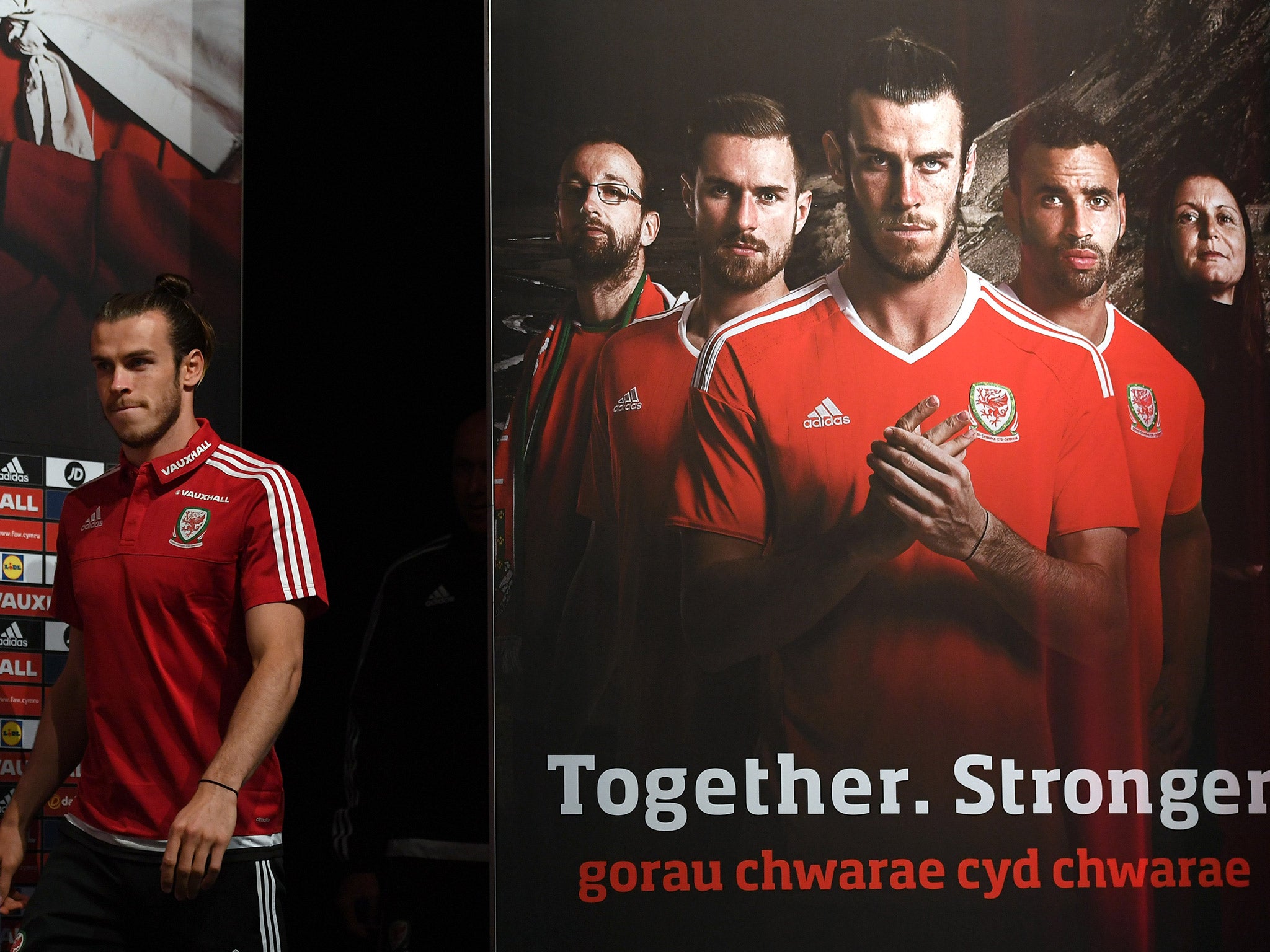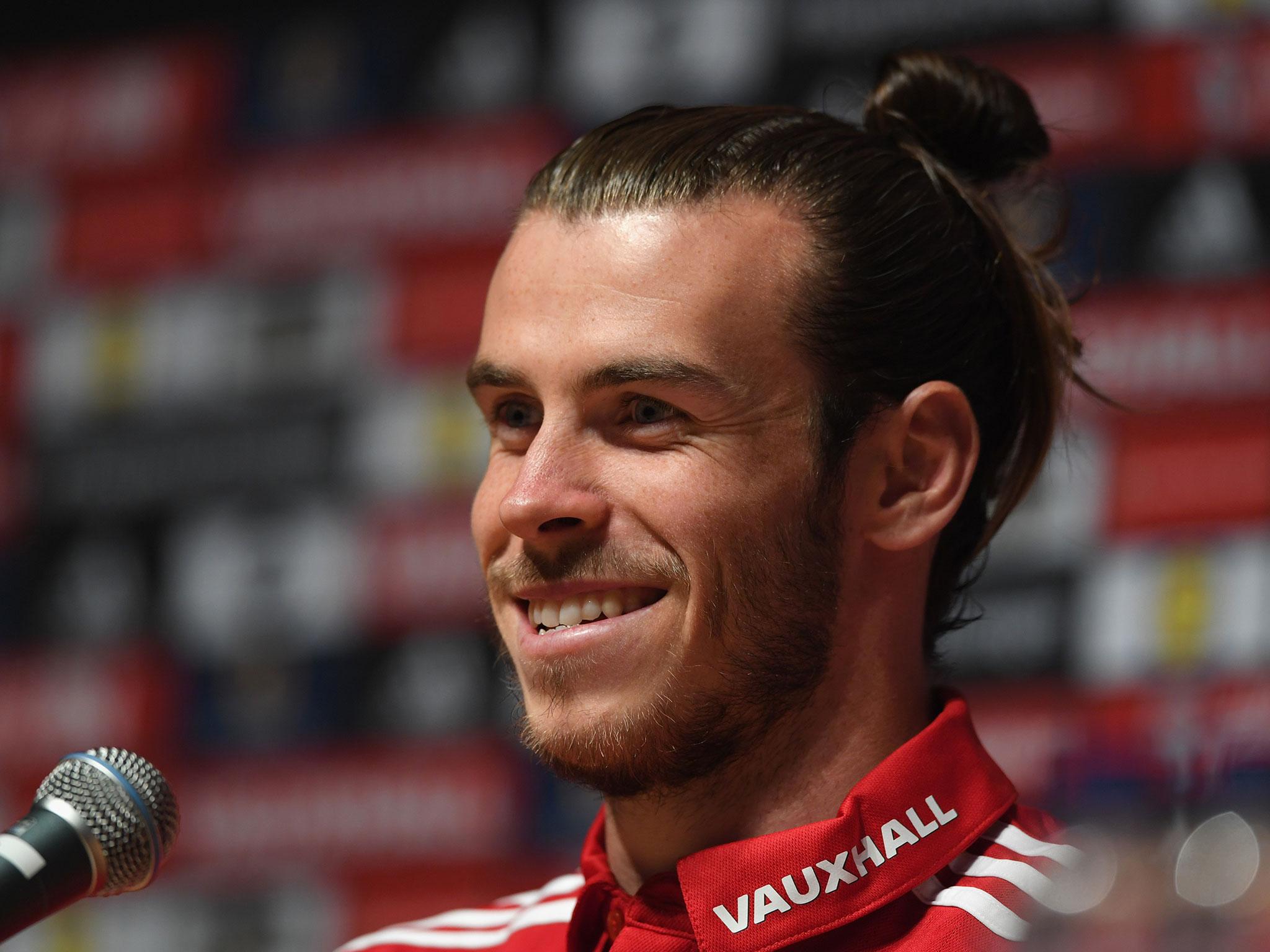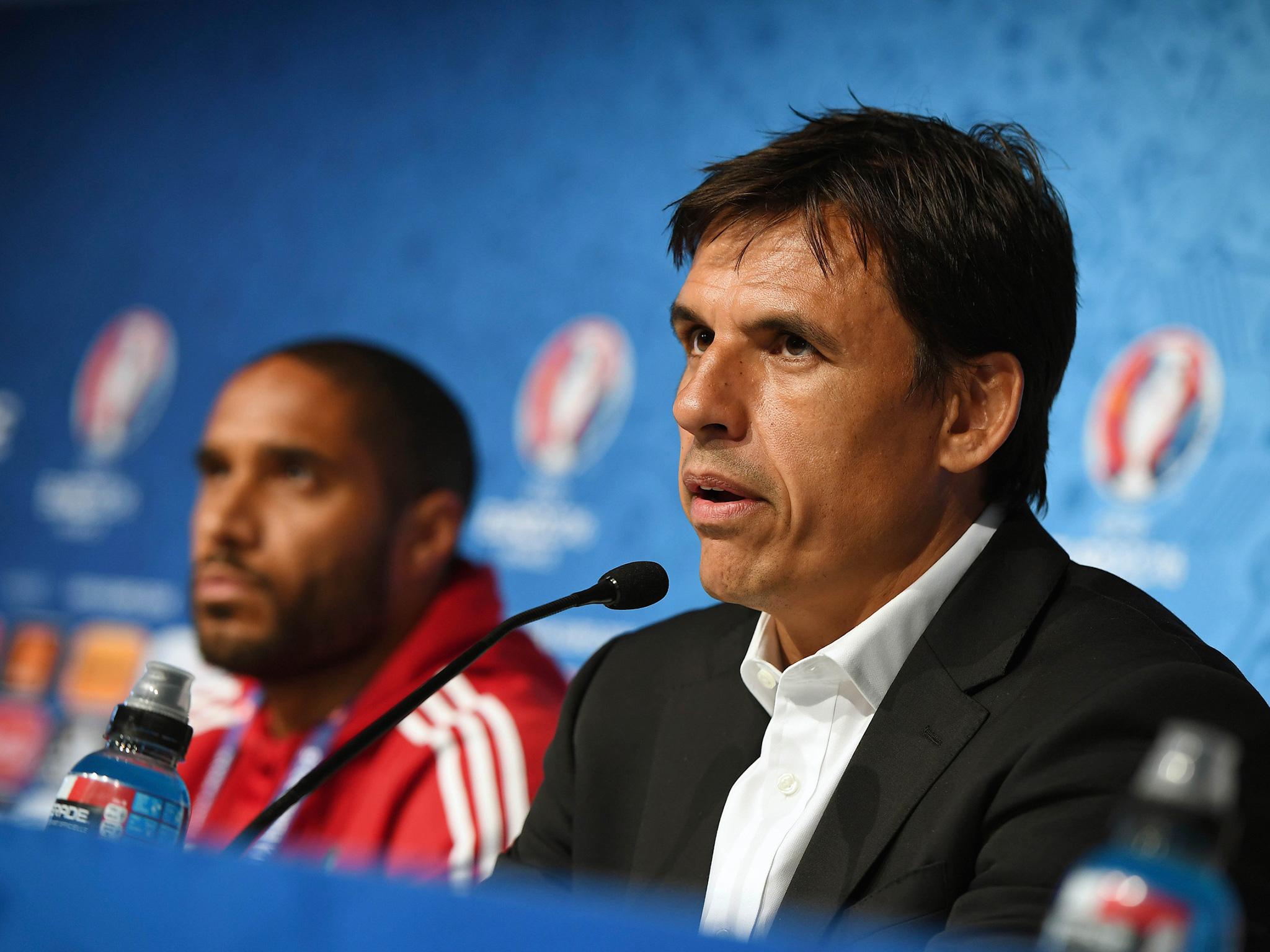Wales vs Belgium: Guitars, goals and hashtags - how Wales built something England do not have at Euro 2016
The death of Gary Speed, the failure to qualify for the 2014 World Cup and the subsequent Euro 2016 qualifying have all helped build an incredible camaraderie that is spearheaded by Gareth Bale's and Aaron Ramsey's desire to play for Wales

Your support helps us to tell the story
From reproductive rights to climate change to Big Tech, The Independent is on the ground when the story is developing. Whether it's investigating the financials of Elon Musk's pro-Trump PAC or producing our latest documentary, 'The A Word', which shines a light on the American women fighting for reproductive rights, we know how important it is to parse out the facts from the messaging.
At such a critical moment in US history, we need reporters on the ground. Your donation allows us to keep sending journalists to speak to both sides of the story.
The Independent is trusted by Americans across the entire political spectrum. And unlike many other quality news outlets, we choose not to lock Americans out of our reporting and analysis with paywalls. We believe quality journalism should be available to everyone, paid for by those who can afford it.
Your support makes all the difference.A moment in the hotel bar at Haifa, on Israel’s Mediterranean coast, gets to the heart of why Wales have travelled from nowhere to the high peaks of the European continent in the space of two years.
The players had just beaten the Israelis 3-0 in a qualifier for these European Championships, so the guitar was fetched out and Owain Fôn Williams, then goalkeeper of Tranmere Rovers, a club propping up League Two, was joined in a rendition of Elton John’s ‘Your Song’ by Gareth Bale, the world’s most expensive footballer. When they got back to Cardiff the players asked the de facto player liaison officer Mark Evans if the Football Association of Wales would buy them a team guitar for future post-match occasions. Needless to say, the governing body obliged.
Bale’s deep attachment to this team is, needless to say, a hugely substantial part of the picture. It is generally him or full back Neil Taylor tapping a glass when a new player, medical staff member or different bus driver is in their company and in line to stand on a chair and sing after supper. When a trip of the World War I graveyards was organised after the Euro 2016 qualifier against Friday night’s opponents – Belgium - Bale specifically asked if the team could see the grave of Hedd Wyn, the Welsh poet killed at the Battle of Passchendaele just weeks before being posthumously awarded the Bardic Chair at the 1917 National Eisteddfod. Bale’s mother had told him the story years earlier and he was intrigued.
There’s an irony about Bale, who is always available, making his full Wales debut, 16 years and 315 days, because of the umpteenth Ryan Giggs Wales withdrawal, in May 2006. But £85m players don’t generally run through walls to play for Wales. A virus he was struggling with before a game against Scotland in World Cup qualification was serious enough for the national association to fly him to Glasgow independently of the rest of the team, yet he still played the next day.
All of these insights and very many more belong to the rich and absorbing portrait of the Welsh team’s journey from obscurity to these championships provided by leading Welsh football journalist Chris Wathan in his new book, Together Stronger. But the book’s deeper revelation is something England would be very wise to take note of in this of all weeks. It is how a Welsh team ethic was built.
Its roots are immutably tied up with the memory of the individual whose name will be sung and memory invoked in the Lille Metropole on Friday night, where he - Gary Speed - would have been sitting in the manager’s dugout if events had taken a different course. When Speed died so very prematurely, Wales turned to his friend, Chris Coleman, as successor and there is no doubt that the complicated psychological challenge that represented wore away at him for months.
The shock of Speed’s death was such that when Coleman, managing Cypriot side AEL Larissa at the time, was called by a friend and told “Speedie’s dead”, he thought the he meant David Speedie, the former Coventry and Liverpool player. (To those in Speed’s circle, ‘Speedo’ had always been his name.) The two of them had been in competition for the Wales job when John Toshack’s departure had made it available. Speed, with that easy manner he always had, neutralised any awkwardness when landing the post by ringing Coleman to say how comfortable the seat in the manager’s office was. They laughed.
Coleman felt it was a kind of betrayal to be taking it on. As Wathan’s sensitive portrayal of this period reveals, he felt a need to do things Speed’s way and only after one of the shattering jolts on this extraordinary road to Lille – a 6-1 thumping to Serbia in Novi Sad which was Wales’ third heaviest defeat since the Second World War – did he reappraise things. He changed captains, moving aside Speed’s nominee Aaron Ramsey whom Coleman felt was trying to “take the corners and head them in” and he changed the system, while retaining the professionalism – analytics, cuisine and team building – that Speed had set in train.
The collective spirit kindled in those dreadfully dark and difficult days, with the perennial thoughts of ‘What would Speedo have wanted?’ fostered a commitment to Coleman that in different circumstances might have waned.
It has certainly taken him time to grow into the role. He almost quit after Novi Sad, and was not safe after the 2014 World Cup campaign, with its aim of reaching “Rio for Speedo’ failing so fundamentally. And the bad old days of Welsh organisational chaos seemed as real as ever on the occasion when Coleman realised he had lost his passport, 12 hours before a flight from Cardiff airport to play Macedonia. While the squad set off to Skopje, Coleman “was heading to Newport’s passport office,” Wathan writes. Wales went down 2-1 and though their fans had treated him to a rendition of ‘Everywhere you go, you always take your passport with you’, the Welsh FA were not amused.
Coleman was also saved from what he believes was the certain sack when Bale’s 81st-minute winner rescued Wales from the ignominy of starting the qualifying campaign for these championships with a draw in Andorra, on the other side of the Alps from France. “I knew what would have happened,” Coleman tells Wathan. “You can’t come away from Andorra not winning. You just can’t. He got me out of it.”
But they’d all been in this together. They’d all been there after the hammering in Novi Sad on the night when, only ten months on from Speed’s death, Craig Bellamy told them in the dressing room: “We’ve got to get over this. I don’t know how, but somehow we’ve got to get going again’.”
There were the fledgling signs of a belief that the young side could be onto something for the European Championships and – perhaps because Bale and Ramsey were so committed - the Welsh people seemed to intuit it, too. An anticipated 20,000 crowd for Wales’ first home qualifier against Bosnia in October 2014 turned out to be nearer 31,000. The game ended goalless, but then came the win at home to Cyprus - and then the first of the two matches against Belgium which were the tipping point to qualification and make it so fitting that they should be the quarter final opposition now.

It was around the time of the away game in Brussels against the world’s then 4th ranked team – in June 2014 – that the Welsh Football Association also began looking for a way of defining what the team represented in a way that supporters and players could share. The words which had been stitched into the badge of the team shirt since 1951 pushed them towards finding one. They state: ‘Gorau Chwarae, Cyd Chwarae’ (‘Best Play is Team Play’) and these were modernised as ‘Together. Stronger.’
What might have seemed like a commercial gimmick, overseen by the association’s commercial and marketing head Ian Davis, became something substantially more in the hands of the players.
They were asked to encourage supporters to provide their social media profile images, to be used on a mosaic in which Ashley Williams, Ramsey and Bale were to feature. The players’ use of #TogetherStronger through their own social media channels created the first mass awareness of the new motto, made it something far more than cheesy and, as Wathan explains, prompted a huge response to the request for images. The motto reached 10.9m users and prompted 208,000 fans to respond – enough to fill the mosaic five times over.
No players’ arms evidently needed to be twisted as players tweeted out pictures of themselves in training or in camp with the same hashtag. “The natural feel of the slogan’s evolution created even greater connection between the supporters,” Wathan writes. It was used regularly in press conferences. Players from the under-21 sides, the women’s team and the deaf team, as well as supporters, were all included as the posters using it sprang up around the country. Suddenly, the slogan actually seemed to stand for something.

It was the players’ openness to ideas – Bale as much as anyone – that also made attempts to introduce them to elements of Welsh history effective, rather than forced. Some of the squad got interested in Mark Evans’ fascination with the nation’s history. He’d mentioned a song he knew one day - Yma o Hyd – the patriotic folk tune by Dafydd Iwan which translates as ‘We’re Still Here’, a reference to Welsh unity and defiance as a nation from even Roman times. He sang it and explained the words and historical relevance. The room fell silent as he did so.
These ideas were coalescing when, with seven points from their opening three games, Wales made the trip to Brussels to play Marc Wilmots’ side. They secured a goalless draw, triggering celebrations which will be remembered for Zombie Nation’s ‘Kernkraft 400’ which had featured prominently on the Brussels stadium PA. The players danced to it in front of the fans. That a trip through Flanders to the Artillery Wood Cemetery outside Ypres, where many of the 1,307 soldiers buried or commemorated are Welsh, came on the morning after the match, not before, said something for what was building.

The return game in Cardiff three months later was Wales’ “Cup Final,” as Coleman later put it, and the now legendary 1-0 win was inspired and delivered by goalscorer Bale. It was towards the end of the game which, with a shattered Bale on the touchline trying to stretch out a cramp, the Welsh contingent struck up an impromptu a cappella rendition of the national anthem – something that no one could ever recall being sung in the course of a match before. Sky Sports commentator Bill Leslie simply stated: “These are special scenes.....something is happening in Welsh football” and let the singing anthem substitute for commentary. The Zombie Nation anthem from Brussels was commandeered for the Cardiff tannoy. “We like to sing, we like to dance, we’ve got our passports and we’re off to France,” the Welsh chanted.
We play table tennis. We play golf. We do quizzes. In fact we do everything together. There is a very good camaraderie.
Wathan reflects that “if the euphoria felt that night against Belgium did eventually subside, it never really died”, though what comes out most clearly in his book is the pleasure the Welsh players have found in the process of getting here. In the week when England’s departure was followed by the sight of the team mascot discarded in a skip in Chantilly, L’Equipe on Thursday picked up on Bale’s observation that the side should “Savourer ce moment’ and related that he had described the joy they are taking in their own company.
“There is not much to do at the hotel outside of training, but we try to enjoy the experience to the fullest,” the paper quoted Bale as saying. “We play table tennis. We play golf. We do quizzes. In fact we do everything together. There is a very good camaraderie.” To be here, saying that, seemed so improbable as they took in the enormity of Speed’s death. Such has been the nature of the incredible adventure.
Join our commenting forum
Join thought-provoking conversations, follow other Independent readers and see their replies
Comments